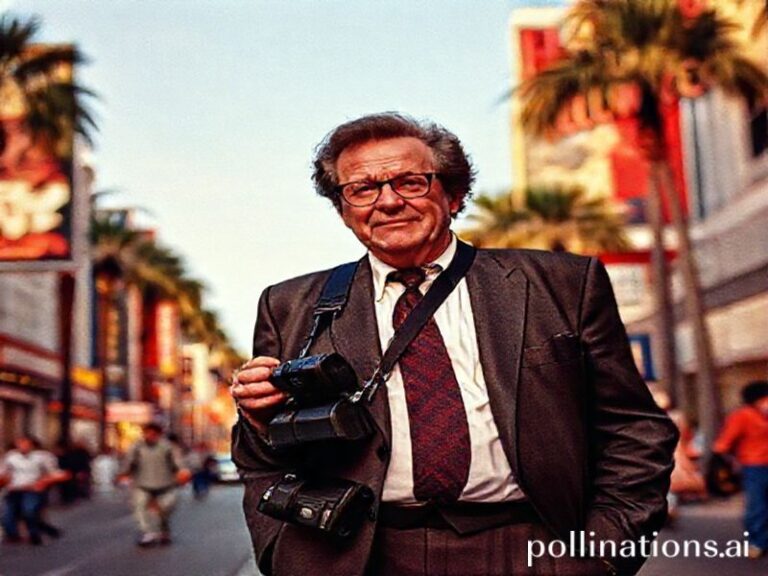Strictly Global: How the World Fell in Love with the Rules That Chain It
Strictly Speaking: How the Planet Learned to Love the Cage It Built for Itself
By our man in the departure lounge, passport ink still wet
Strictly speaking, the word “strictly” has always had a passport problem. It shows up at customs with its shirt tucked in, visa pre-approved, declaring nothing but certainty. Yet everywhere it lands—from Singapore’s spotless metro to a smoky cantina in Oaxaca—it is received with the same cocktail of fear, relief and perverse pride. The planet, it turns out, has gone into voluntary lockdown—not with iron bars, but with laminated rule sheets, polite signage and QR codes that smile while they scan.
Consider the global choreography: Tokyo train guards bow in perfect synchrony because the manual strictly demands it; Parisian waiters sneer with equal precision because the Michelin guide strictly forbids warmth; and somewhere above the Arctic Circle, Norwegian bureaucrats issue snow-removal fines with the same grave nod once reserved for Viking raids. Each culture swears its version of “strictly” is unique, a delicate snowflake of local values. In reality, the snowflakes have been mass-produced in Shenzhen, shrink-wrapped and exported with bilingual disclaimers.
The pandemic, of course, was Christmas morning for the strictly inclined. Overnight, the world discovered that nothing unites humanity like a shared excuse to micromanage one another. Australia welded shut apartment doors; Italy mandated the length of pasta breaks; Canadians politely queued two metres apart, apologising to the virus for the inconvenience. Meanwhile, in Florida, freedom fighters died to defend their constitutional right to cough on strangers—yet even they formed orderly lines at the gun store, because the ammo rationing notice said “strictly one box per customer.” Nothing makes Homo sapiens feel safer than a laminated rule—except, perhaps, the opportunity to scold the neighbour who ignores it.
Global supply chains—those fragile veins of late capitalism—now run on the same principle. “Strictly no substitutions,” warns every container manifest, right above the fine print blaming force majeure for why your sofa will arrive sometime between next June and the heat death of the universe. The chip shortage, the grain blockage, the baby-formula drought: all of them curated by men in open-necked shirts chanting “strict protocols” while their spreadsheets burst into flames. Consumers, ever the masochists, find this comforting. Tell us the wait is mandated by ISO-certified misery and we will preorder our disappointment like VIP tickets.
Financial markets have joined the conga line. Cryptocurrency exchanges, born to liberate money from “the man,” now enforce KYC rules so strict that Satoshi Nakamoto himself couldn’t open an account without a selfie holding today’s newspaper. Central banks, once sleepy temples of beige bureaucracy, issue digital currencies with smart contracts that can freeze your wallet faster than you can say “civil forfeiture.” The revolution will be permissioned, two-factor authenticated, and subject to terms and conditions updated every thirty days.
Even love has been streamlined. Dating apps from Lagos to Lima rank prospects by algorithmic adherence to “strict preferences”: height, star sign, carbon footprint. Swipe left on anyone whose emotional baggage exceeds the 7kg carry-on limit. The result is a planet of lonely hearts complaining that nobody meets the specifications—while simultaneously ghosting anyone who does, on the grounds that perfection is suspicious.
And yet, like dieters sneaking midnight spoonfuls of Nutella, we relish the tiny rebellions. Tokyo teens jaywalk the second the guard’s bow dips too low. Parisian waiters wink when the maître d’ isn’t looking. Norwegians quietly refuse to report the extra centimetre of snowfall. Each infraction is a love letter to chaos, proving we still recognise the cage even as we re-tweet its blueprints.
So here we are, citizens of a strictly regulated world that keeps promising to set us free once the paperwork clears. The joke, of course, is that the paperwork is the destination. We queue for exit stamps that never come, clutching numbered tickets like rosaries. Strictly speaking, we asked for this. And strictly speaking, we’d panic if we got anything less.







